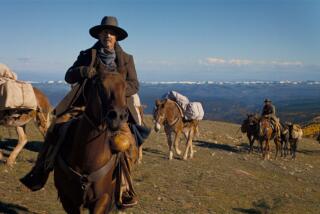‘AMERIKANA’
Having watched all 14 1/2 hours of “Amerika,” I cannot understand why writer/director Donald Wrye felt it necessary to postulate the unlikely scenario of a Soviet occupation to make his point about the erosion of American ideals.
In the last few decades, we Americans have seen nearly all the incidents from the miniseries played out.
We have seen internal exile and forced relocation (the Japanese internments, the expulsion of the Navajo from Big Mountain, Ariz.); homes bombed and incinerated by police in Philadelphia; the makeshift dwellings of the homeless razed by L.A. police; the hideous spectacle of Soviet-style “good citizen” children turning in their parents to the police.
We have already experienced every atrocity perpetrated by the Soviets in “Amerika,” reflected in the behavior of the various levels of government in America. The questions raised by Wrye’s film are not whether “it can happen here,” but whether it already has, and whether it makes any difference whether the commissar trying to rule your life speaks with a Russian or an American accent.
VICTOR KOMAN
Long Beach
More to Read
Only good movies
Get the Indie Focus newsletter, Mark Olsen's weekly guide to the world of cinema.
You may occasionally receive promotional content from the Los Angeles Times.










